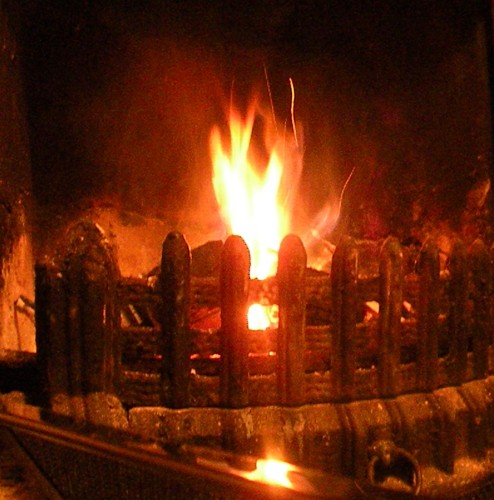
Hearthfire (Photo: R. Wildermuth)
I celebrated Imbolc before a hearth-fire with a Christian.
Not a ‘pure’ Christian, mind you. One learns in Druidry that purity isn’t something that can exist within Nature, let alone human belief. What’s purity anyway, except a violent stripping away of flesh and bone to get to the very ‘pure’ and perfect core of existence?
And by then, all you’ve got is a pile of shredded skin and muscle and hair and no life left.
The search for ‘purity’ is what gave us the Puritans and the Iconoclasts, riotous men and women shattering ancient statues and art-work to remove every last vestige of Pagan idolatry from the churches of Europe. It’s the same ‘purity’ which torched the Library of Alexandria, what led the Taliban to destroy ancient statues of the Buddha in Afghanistan. It’s even our modern fetish for purity that’s helped create antibiotic-resistance strains of bacteria through anti-bacterial soaps.
We built this hearth-fire, this impure Christian and I, on Imbolc. He’s not a ‘pure’ Christian, as I said. He reads Tarot, has seen ghosts. Cavorted with psychics in New Orleans, has a tattoo of the triskelion on his arm. Comes from a line of Scottish matriarchs, who inarguably possessed a ‘kenning’ sharper than all my recent training has been able to hone. But…he believes Jesus is pretty awesome, and he worships the Christian’s god. But doesn’t blink when I tell him of mine.
We built this fire on Imbolc, or what some Christians call “Candlemas.” He knew nothing of Brighid. And, as I’ve sworn to be one of her Bards, I told him of her, or the hers, the many Brighids and Brigs and Brides and Brigites and then of St. Brigid of Kildare, that saint whose stories change most quickly according to the teller. A Christian convert or a hidden Druidess, a Catholic cover-up or a Pagan survival. Women tending ancient flames to an even more ancient goddess, or nuns helping remember the Light of Christ. The stories blend into each other so messily that the ‘pure’ Brigit can’t be found by stripping back her tales without throwing away the wrong stuff.
But we’re both in front of a fire – a fire built to her and a fire built for warmth, a fire for poetry and a fire for light – stumbling over the meanings of our beliefs as the flames consume the wood in her hearth.
I watched his face in that flickering light, and I listened to his laughter as he spoke of what fire means to him, just as I laughed as I spoke of what her fire means to me. Between us, fire, illuminating belief.
We told each other stories, recited others’ words. It was he who quoted Tom Robbins’ discussion of fire from Still Life With Woodpecker:
“Three of the four elements are shared by all creatures, but fire was a gift to humans alone. Smoking cigarettes is as intimate as we can become with fire without immediate excruciation. Every smoker is an embodiment of Prometheus, stealing fire from the gods and bringing it on back home. We smoke to capture the power of the sun, to pacify Hell, to identify with the primordial spark, to feed on them arrow of the volcano. It’s not the tobacco we’re after but the fire. When we smoke, we are performing a version of the fire dance, a ritual as ancient as lightning.”
“I need a cigarette, and then need to tell you a story,” I said, “and not just because of that quote.”
II.
“Mom’s talking to herself again.”
I’m still haunted by the voice of my little sister saying those words. She’d come to me, panicked, looking for reassurance, and I’d try to calm her.
Our mother is developmentally disabled. ‘Mentally retarded’ is what they used to call people with her intellectual capacities. Now we have more clinical and less loaded (and also less descriptive) terms for her condition.
Most kids probably experience a time when they’re certain that they’re smarter than their parents. Adolescents certainly do, and they’re usually wrong. Unfortunately for my sisters and I, it was true, and it was much more unfortunate when our mother became schizophrenic.
No one diagnosed her until several years after her ‘break.’ Neither my sisters nor I knew anything of mental illness, and the only community we had–a sprawling and very wealthy mega-church in southeast Florida–refused to believe us when we suggested she was a little ‘crazy.’
“No, your mother’s a wonderful person and ‘really kind.’ ” they’d tell us whenever we sought help. “You kids are so fortunate to have such a sweet and generous woman as a mother.”
She was generous, yes. And that was the problem. She’d sign over her entire paycheck to the church every week. I remember something else the elder of my two sisters would say. “There’s no food. I’m really hungry.” Those are the worst words ever, especially when you’re 14 years old and the only one around to fix that problem.
III.
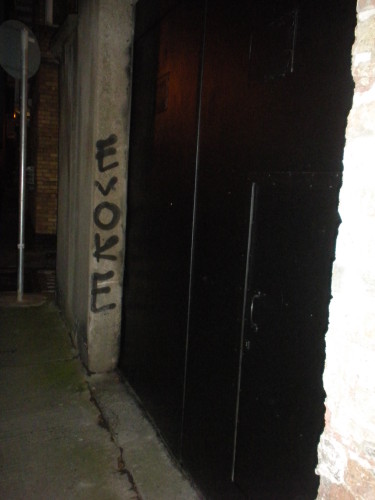
Graffiti on church entrance (Photo by R. Wildermuth)
The First Baptist Church of Naples, Florida had just gotten a slick new pastor, and we were all excited.
I remember when Hayes Wicker came—the church we’d attended for a few years was suddenly becoming a different place, full of’ ‘promise.’ Things were gonna change, we were told. Our Church was destined for greatness.
Soon after he arrived, a new fund-raiser was announced called “Reclaiming the Land.” There was a painted wooden box up by the altar named the ‘war chest,’ and people were encouraged to fill it with money, jewelry, stock-notes and other valuables all toward the building of a new, bigger, and better church. Special music and performances, lots of quotes from Exodus, and an ever-increasing emotional furor whipped up the congregation to give until ‘it hurt.’
My mother gave until we hurt. She’d had her first schizophrenic break a year before that. She’d started talking to herself, to angels and demons and God, unable to differentiate between them. We’d be in her car as she drove, sitting in terror as she shouted back to invisible voices commanding her to drive my sisters and I off a bridge into the sea.
Despite her condition, she was able to hold on to a job for awhile. She was the really kind and sweet woman behind the bakery counter at a grocery store, the one who’d offer endless samples of cakes and cookies to anyone who came by. And she was eventually fired for passing out too many samples, entire cakes and boxes of cookies, because she didn’t quite understand how Capitalism was supposed to work.
She also didn’t understand that signing over entire paychecks to a mega-church with a $30,000/week budget meant that her children would have no food. But who could blame her, really? Other church members openly praised her for her selflessness and berated me when I once tried to stop her from giving all of her money ‘to God.’
Soon after, a deacon of the church lectured me on how I should ‘man up’ and get a job to support my family.
“You gotta be a man of God,” he’d told me. “Stop expecting your mother to take care of you like you’re a welfare black.”
The church was full of whites, most of them from money, all of them Republican, and this was what being Christian was about. Capitalism and Christianity were so intertwined that when pastor Hayes Wicker violated IRS regulations by telling the congregation during a presidential election that “anyone who voted for Clinton was voting for their wallets not for God,” no one reported it
So I got a job just after turning 14, first at a Christian bookstore where my mother regularly bounced checks. Later, I worked at an ice-cream shop managed by a woman from our church. I started paying rent, buying groceries for myself and my family, but also started missing school—190 days in all. Others skipped school to do drugs; I skipped because I was exhausted from work and taking care of a household.
All this to help a group of rich white men build a bigger church. And we were told never to apply for food stamps, because that was socialist and anti-Christian.
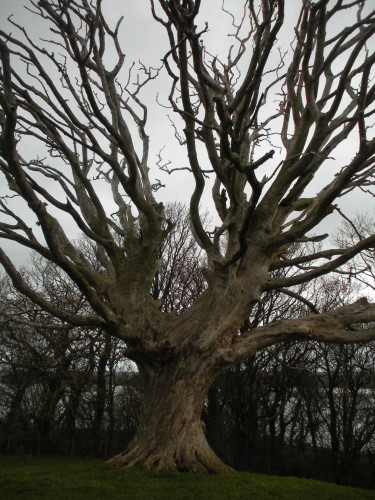
Tree on sacred hill (Photo by R. Wildermuth)
IV.
I felt a bit bad telling this to my companion by the Imbolc fire.
None of what happened to my family was his fault, nor even the fault of the particular god he worships. There’s no verse in the sacred writing of any religion which demands a mentally-ill, developmentally-disabled woman give all of her money to a god and never once apply for government assistance.
He was understandably angry, though, but not at me. We both know the Bible quite well. I surprised him by reciting the first chapter of the Gospel of John from memory (but then added ‘even the devil can quote scripture,’ so he didn’t get the wrong impression).
We both know there’s nothing in the mythic lore of the desert god (he’d call him something else, certainly, and it’d be capitalized) lauding Capitalism, America, and all the other cringe-worthy propaganda one hears from the pulpits of some Christian preachers. Despite this, the sick alliance between American Christianity and exploitation is undeniable.
But there are several Christianities now, just as there have always been. Historians, theologians, and most of us often divide and classify these Christianities according to schisms and organizational structures, but there’s another axis of belief that we often ignore.
Consider. When Christianity came to the British Isles, for instance, it did not destroy the indigenous religions of the others who lived alongside them. It wasn’t until certain political powers arose, donning the religious trappings and divine justifications of the Monolithic Other that strife, oppression, and murder followed the priests of the One-God.
Religion isn’t always just religion—it’s also a mode of governance. Christian Rome slaughtered Druids and Heathens in the name of their God, yes, but they also killed at the behest of their Empire. When Rome fell, the political structures of the Empire remained. Later, the inheritors of Roman power also inherited the political and bureaucratic structures of parish and bishopric. Priests and monks were not just devotees of a Creator-God, but political emissaries and advisers and sometimes rulers themselves.
With the imperialist enforcement of a monotheistic religion upon the peoples of Europe came the foundations of modern mono-culture, the annihilation of difference to make governance easier.
One can argue that this wasn’t ‘pure’ Christianity, but what then is pure Christianity?
Like Paganism, like Nature, like humans, there is likely no such thing. The true essence of monotheistic belief cannot be gotten at without stripping from its structures so much that it is no longer recognizable, reductio ad absurdum, perhaps, or reductio ad nihil. If anything, Monotheism is reductionism in itself—starting from the henotheistic tendencies of early Semitic peoples, worshiping one god among others (‘no other gods before me’) until deciding that one god was the Only God. From many, to few, to one.
This reduction led not only to a new sort of religion, but to a new form of Empire. The Roman Empire struggled to rule over many disparate peoples, and its answer was the syncretic absorbtion of other gods into its own (Interpretatio Romana). Monotheism, however, offered an easier route–the annihilation of all other gods as false and replacement with a True (One-God). And, this has been the model for all Western empires since, whether that one-god be the God of the Christians or the God of the Capitalist Market.
Reducing the myriad beliefs, cultures, traditions and gods into one easily-governed People is no simple task, nor really is annihilation. People keep being born; keep encountering gods and spirits; keep creating new traditions or recovering those that were lost. Pagan beliefs never went away, despite the damming of holy wells and cutting down of sacred trees, but neither have the many heresies the early Roman Church attempted to stamp out by edict or fire. Only one system of control seems thus far to have succeeded where so many political seizures of religion failed: Capitalism.
V.
American Christianity has an awful relationship with those of other religious beliefs, whether they were the Animistic and Nature-Revering religions of the First Nations, the Catholics of Spanish and French tradition, or even the aberrant heretics within its own colonies. This has not changed one bit, even if the ‘enemy’ has changed–America’s new ‘barbarian’ is the Muslim and their imagined ‘existential threat’ to the even more imaginary ‘free-world.’
Christianity, particularly, provided the theological and philosophical justifications for the destruction of many so-called enemies. European Paganisms were conquered only a little less quickly than other indigenous and varied beliefs through Christianity but not because of it. Without ideological and cultural control, no Empire can last very long, and Christianity just happened to be quite well positioned to fulfill this role.
Too many Pagans miss this point when we speak of Monotheism: the destruction of indigenous beliefs may have been ‘in the name’ of the Christian God, but it was actually done for the purpose of profit and power. The gold and silver stripped from South and Central Americas, the precious woods and ores (and slaves) hauled from Africa, and the tea, textiles, and spices of Asia were not just the bonus-prizes garnered from colonization by Christian empires—they were the very point. Catholic and Protestant clerics merely helped assuage the guilt of the many who needed convincing that killing others for king and commerce was not a horrible thing.
Any Christian can rightly protest that Imperialism, Racism, and slaughter are hardly in the spirit of The Christ, and they’d be correct. But such things don’t matter when power is involved, and there’s a frightful thing which happens when you add wealth into the mix.
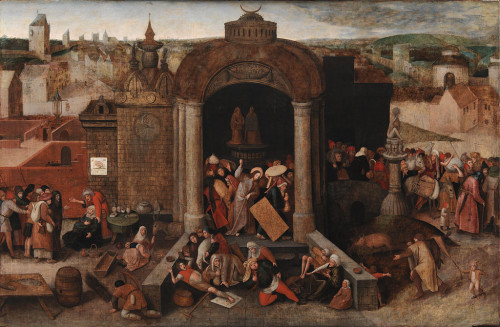
“Cleansing of the Temple” (painter unknown, c 1570) [Public Domain]
VI.
That Southern Baptist church whose new building was partially funded by a schizophrenic, mentally-disabled single mother was affiliated strongly with American Republican and Libertarian political causes. Oliver North (of the Iran-Contra affair) was a featured speaker, as was Charles Colson (of Watergate) and many other right-wing, pro-Capitalist speakers. Evening sermons often included ‘business meetings’ where people spoke about the threats of gays, socialists, and welfare-moms to God’s plan for America.
The night that I remember best was when a women came to talk about the godlessness of San Francisco. At one of these talks, I learned why one should never go to San Francisco.
“The hospitals are full of men with punctured lungs and ruptured livers,” she’d told us, solemnly. “They’re all gay men, and it is because they’ve turned away from God’s plan for procreation.”
She went on to speak of a peculiar depravity, common among the Sodomites of California. Because gay men could not experience ‘God’s plan for procreation,’ they tried to find other ways to experience pleasure, and the most dangerous of these involved ‘squeezing the liver’ through the digestive tract. “Because they don’t have sex the way God intended us to,’ she’d explained to the gathered devoted, “they reach their arms into each other’s rectums so they can crush each other’s lungs and pinch their sex-partner’s livers to mimic sexual orgasm.”
I was 14 at the time, gay but closeted, and I was terrified despite the anatomical absurdity of her sermon. And I avoided San Francisco for the next two decades, just in case.
Her tale of fear was hardly the only propaganda I heard. We were urged to oppose voter registration at DMV’s (‘Motor-Voter laws’), since this would ‘increase the amount of godless people abusing the electoral process.‘ We were urged to support the first invasion of Iraq, to ‘get out the vote’ against Clinton, and to push hard in local politics against inroads of ‘godless’ socialism such as welfare and food-assistance to immigrants.
Of course, not all Christian churches are like this, though the influence of evangelical churches on American politics has always been profound. But we should be cautious, again—who’s influencing whom?
Because for as many Christians who advocate unbridled Capitalism, rally for foreign invasions, and oppose worker-protections and union activities, there are also those churches who have protected illegal immigrants from deportation, who support picket lines, who protest environmental damage, and who advocate an end to the Capitalist system. In places where Capitalism is doing the most damage, Liberation Theology has a strong hold over priests, pastors, and believers alike. Priests gunned down protecting their people from machine-gun wielding landlords in South America, nuns laying themselves in front of bulldozers and tanks, and solidarity marches of workers holding crosses are all still common occurrences in South America.
Consider even the current leader of the Catholic Church, once a steady and dependable bastion of pro-Capitalist, pro-authoritarian government. Pope Francis is hardly a revolutionary, of course, but one cannot help but think he’s doing certainly more on the side of St. Francis and Dorothy Day (the founder of the Catholic Workers) than on the side of the Capitalist
VII.
Really, though–how do religions become lapdogs of Empire?
Likely, the same way anyone does. For some, investment in the systems of power means privileged positions and the ‘ear of the king.’ Like the courtiers of medieval monarchists, being in the halls of power grants access to that power, even if it merely ‘trickles down’ or falls from authority’s table like scraps for dogs.
Governments are hardly naïve in their use of the faithful and the faithless alike. In the U.S., Christian leaders lend moral and ideological support to each new war against another Middle-Eastern country, but so, too, have anti-religionists like Christopher Hitchens and Sam Harris. ‘Men of Science’ standing alongside ‘Men of God’ like Pat Robertston and Jerry Falwell, together proclaiming Islam to be the greatest threat to civilization, urging America to claim its moral right and duty to conquer and subjugate these primitive, violent societies.
And between Government and the Religious are the Wealthy, playing each other deftly, wisely investing in both sides. So much of American Christianity defends Capitalism that I suspect many have confused the ‘invisible hand of the market’ with the Holy Spirit; add to this both Democrat and Republican politicians refusing to restrain the rich, and one can’t help but think this new Capitalist trinity is actually One God united in its war against the poor.
And the poor are the multitude, and they are everywhere. And who stands for them?
VIII.
There’s a story I didn’t tell my companion that night of Imbolc, before Brighid’s fire. I guess I’m telling him now, as I’m telling all of you. It’s not a story, but a dream, a vision I can never shake from the time I first met the gods.
We were standing in a light rain, standing in that Other light.
The crowd was so large before me, anticipating, thronging, so many of them I could not make them all out. And they were all different, people from every nations, drest foreign, beautifully, gaily, but not in high fashion or decked in wealth. Rather, we were the poor of the worlds.
I remember the colors of their garb, bright and vivid, carnivals of hued scarves and robes and cloaks. Some were drab, yes, but as intoxicating to the sight as the gaily-dyed costumes of the others.
Many had skin like mine, but we were a scant portion of all these peoples gathered before the gates, waiting to enter. Most were darker, skin colored like deer hide, or like coffee with cream, or sepia, or sunlight against tree-bark, or rich humus.
I didn’t know where we were going.
I watched the procession pass through great doors before us, opening into a veneer of the modern, impenetrable entrances to inscrutable skyscrapers. Each entered after answering a question, a pass-word, it seemed, or a pass-name.
I worried. I didn’t know what was needed as I approached the gate. I watched the beautiful myriad walk through those gates with wonder and sadness—I did not think I could join them.
“You look worried,” said a man beside me, his face kind, curious, calm. “What is it?”
“How do I get in?” I asked, glad of his offer to help. “I don’t know the code.”
He smiled back at me as a light spring rain began to fall around us. “Oh,” he said, his voice kind. “It’s Brighid.” He paused, appearing to scry through the drops falling from the sky. “See? You can tell by the way the rain is falling, and what’s in-between it.”
I then said her name, entered, and saw we were in a temple far larger than all the earth, full of the poor and faithful of many peoples, many races, and many religions.
Were they all there for Brighid? I don’t think so. But I was there because of her.
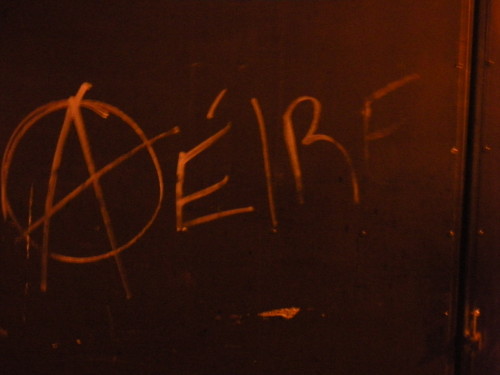
Dublin, Ireland (photo by R. Wildermuth)
IX.
I’m an Anarchist, Anti-Capitalist believer in many gods, and I’ve more allies than I’ll ever know what to do with.
It’s easy to see the similarities of my beliefs to those of the Haitian revolutionaries who asked Erzulie’s blessing against their French masters, or to the anarchist Catholic Workers who fought exploitation of the poor by the rich, or to my many anarchist Atheist friends who are fighting Capitalists, not because their gods demand it, but because they refuse to live in a world where rich get more power than the poor. In the resistance of Buddhist monks fighting Western colonization and the First Nations rituals against the destruction of their peoples, I see the same faith to gods of the earth and the forests instead of gods of kings and commerce.
The reason for this, I think, is that the monolithic force of Capitalism is the worst thing that’s ever happened to the earth or her inhabitants. In the martyrdom of a Catholic priest protecting his people from foreign land-grabs I see the same Love as the First Nation’s tribal leader fasting until a government stops exploiting her people. In her Love and his, I see the resistance of South American indigenous groups against American investment, and in their Love I see Pagan radicals in Oakland risking arrest and potential death to protect vulnerable people from brutal police repression.
And in their Love I see the opposite of the First Baptist Church of Naples, spreading fear, racism and Capitalism in the name of ‘their’ god. I see the opposite of the hateful justifications of Imperialism and Capitalism in the writings of Atheists like Christopher Hitchens, Sam Harris, Richard Dawkins, and Stephen Pinker.
And, too, in their Love I see the opposite of the Pagans eager to support government repression of minorities, foreign invasions of Muslims, those eager to justify their own pursuit of wealth and fame, the opposite of the Pagan who refuses to question the suffering of others and the destruction of the world.
I do not believe there is a one-god, or a one-goddess. I also know for certain there is more than no-god, or no-goddess. Gods and Goddesses are many, perhaps as many as the peoples who have known them.
But the gods that I worship, to whom I’ve been called and to whom I’ve answered, seemed to also be inside that temple in my dream, because they are the gods and goddess of peoples, not of governments or of Capitalism. And I think there were other gods there too, gods of others whom I shall never know.
And so it is easy, then, to recognize the gods of others, even when they call him The One God, or the all-god, and even the no-gods. How they speak of them matters much less than what they do in their names.
X.
Within that hearth on Imbolc were the fires of Brighid, and also the fires of others. The Christian next to me perhaps only saw the flames themselves, and what those flames have meant to humans, the light and warmth and will ‘stolen’ for us from the gods. But I think I saw something else on his face, burning in his heart as the wood burned in that hearth.
Sometimes fire destroys; sometimes we need to burn it all down. Barricades and dumpsters burning in alleys and streets as police approach. Parliaments and banks also burn when they are of no use to us.
And just as often, fire creates. It is not surprising there’s a Brighid of poetry and a Brighid of the forge and a Brighid of the hostel. There are hearth-fire waiting for any who need it.
And I think, in both kinds of flames, of destruction and creation, are the flames of Love.
The Wild Hunt is not responsible for links to external content.
To join a conversation on this post:
Visit our The Wild Hunt subreddit! Point your favorite browser to https://www.reddit.com/r/The_Wild_Hunt_News/, then click “JOIN”. Make sure to click the bell, too, to be notified of new articles posted to our subreddit.
“So much of American Christianity defends Capitalism that I suspect many have confused the ‘invisible hand of the market’ with the Holy Spirit.” Now that is some excellent writing.
excellent. thoroughly enjoyed.
What an excellent and moving piece!
Beautiful and very, very well written!
Reading such incendiary words of worship of my favorite Brigid is such a joy. Thank you, brother
A beautifully written, well-argued and moving piece once again. Rhyd you truly are a Bard of our modern times!
Otherwise, I feel sorry for the bad experiences that you seemed to have in this Floridian mega-church and it makes me glad that I managed to spend my childhood without such a destructive influence.
More good stuff. I think mainstream respectability entails willing compromise with things that are against the stated values of any decent belief system, sacred or secular.
“Without ideological and cultural control, no Empire can last very long…”
I rather think Rome herself disproved that. Both before and after Constantine, it was always full of many beliefs and many ways of life. Alexander, the Mongols, Britain, many more. Empires cover many lands, by definition, and so they cover many cultures and ideologies.
It’s a good piece, that bit just stuck in my head.
As I’ve gotten older, the myths of capitalism have become ever more evident to me. You have stated beautifully the evil that happens when it subverts religion as it declares its hegemony.
Brilliant and beautiful, my friend. Thank you.
This is a deeply moving piece. You summed up the difference between “organised religion” (i.e. that ruled by an institution and all too often used to exploit people) and “folk religion” (i.e. that constructed and practised by the common man for the benefit of the individual and the community) really well, and as you expressed, this dichotomy is not to do with what the religion actually is, but how it is practised. I hope we can all live in a world one day when religion is not “owned” by capitalists or the state. Bright Blessings.
In no special order:
That is one gorgeous tree!
I see also Brigid the Healer (the Aspect to which I am most in tune) and Brigid the Foster Mother, but you were making a point, linked to what was said in 99% Brighid—A Pagan Liberation Theology by Scott Thompson (linked above) about lesser known Aspects of Her. Thanks for that link, as I found what he had to say much in tune with what you’re saying about theology and capitalism, only from a different space.
I come from a Middle-Eastern background, where hospitality is a very serious thing. I actually do refuse to share food with some people, but for the most part, I learned from my mother that even someone working in your home is offered refreshment. When I’ve hired homeless folk before, they do get fed, as well as having nourishment to take with them. I don’t know that my mother would have hired a homeless person, but if she had, e would have been given the same consideration and dignity as a licensed worker.
My mom likely had PTSD from the abuse from my sperm donor, but we had the basics. I’m sorry you did not. Telling a 14 year old to support his family when there’s an adult in a position to do so is just wrong. Given your mom’s double whammy, someone in the city or county should have been looking out for you kids, but I gather you couldn’t approach them due to the social pressure from your church. I’d certainly give the pastor and deacons and whomever else what for, for how they treated you because of their greed for your mother’s funding.
A very well done piece of wordsmithing. Your telling resonates with me here on Pine Island where Naples still seems like the place where you go to live if you ever get rich..
While the rest of the article was thought provoking, that quote about smoking is pretty much the biggest bit o’ bullshit i’ve read in a while.
I’m a Christian (Anglican, an admirer of the Celtic tradition) who enjoyed this column very much. My boundaries may be sharper defined than your friend’s, Rhyd, but my understanding of my faith requires tolerance and respect for all those walking a path of peace, seeking the light. I’ve learned a lot from Pagan and Wiccan friends. There’s a lot here that Christians would do well to consider and think about. Thank you.
So excellent.
Pagan Rome also slaughtered Druids and far more Celts died at the hand of Pagan Romans than they ever did at the hands of Christians. I’m actually interested as to where you’ve got evidence of the slaughter of Druids at the hands of Christians in Britain or Ireland?